
In 2019, the Boch Center in Boston launched the Folk Americana Roots Hall of Fame (FARHOF), Boston’s newest cultural and educational initiative. It celebrates the lifeblood of America’s musical and cultural heritage. Led by legendary musicians and music executives including Keb Mo’, Joan Baez and Noel Paul Stookey and curated by Deana McCloud and Bob Santelli of the Museum Collective, the Folk Americana Roots Hall of Fame (FARHOF) is dedicated to honoring history, while also building the foundation of the next generation of Folk, Americana, and Roots musicians. Housed in the Wang Theatre, the Folk Americana Roots Hall of Fame (FARHOF) celebrates Folk, Americana and Roots music through displays, memorabilia, artifacts, events, lectures, exhibits and concerts. Their intention to induct members into their hall of fame was delayed by Covid but, over the weekend of April 19-20, the first inductions eventually took place.
Here’s Liz Thomson’s account of the event.
As the old song puts it: Wasn’t that a time! It was a weekend like no other, a celebration of the music that built America. The folk, blues and rock – Americana to use that 21st-century catch-all – that is at once both timeless and timely. Music that never grows old, music which transcends generations. Music which has, in one way or another, influenced everything we’ve been listening to since Elvis first swivelled his hips on prime-time TV and changed the course of popular culture.
Wasn’t that a time!
Boston, and its sister city Cambridge, just across the Charles River, can lay claim to many celebrated names – Aerosmith, the Cars, the J Geils Band, Jonathan Richman and the Modern Lovers, Donna Summer, DMZ, Darlingside, James and Livingston Taylor, Tom Rush, Tracy Chapman, and Joan Baez are just a mighty handful of those whose musical roots can be traced back to the home of the first Tea Party. Yet, it’s not been among the American cities most readily associated with music. An endeavour that’s been quietly taking shape in Boston’s theatre district these last few years will surely change that.
“Events” delayed its launch, for in late 2019 when I spent a couple of days hanging out at the Wang Theater, the 99-year-old Art Deco gem on Tremont Street, with CEO Joe Spaulding and his team, the Folk Americana Roots Hall of Fame museum was poised to open its doors to the public in 2020 and to present its first awards, honouring those whom the Grammy meisters on the Left Coast have too often ignored. The museum has now been welcoming visitors since the world reopened, its collection curated by Deana McCloud whose impeccable credentials include the Woody Guthrie and Bob Dylan centres in Tulsa, Oklahoma. In addition to the exhibits, there are talks and lectures, and small performance spaces.
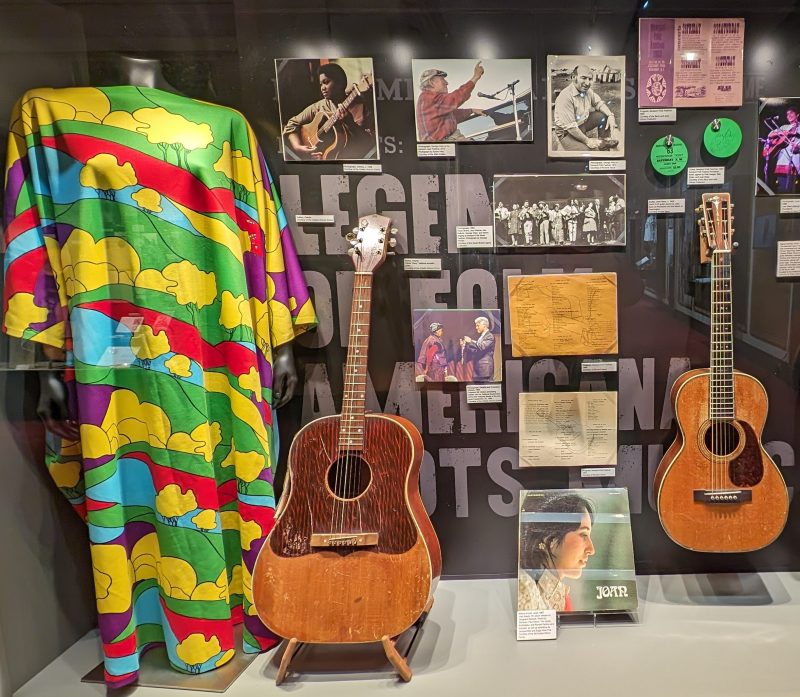
Over two days in mid-April, a grand celebration of the Folk America Roots Hall of Fame’s inaugural honourees took place in the Theater, the event captured by PBS who will air the programme in September. It was an astonishing coming together that left everyone profoundly moved. For here were the children and grandchildren of Woody and Pete, literally and spiritually, and of some of their fellow travellers – the families of Lead Belly, Josh White, Oscar Brand, Jean Ritchie among them – honouring not just their own legacy but the living legacy of this music that swept America in what, in another dark era, was known as “the Great Folk Scare”. Indeed, it is surely the case that had the McCarthy witch hunt not banned Pete Seeger from radio and TV and frightened off innumerable concert promoters, the folk revival would likely not have happened. Seeger – like Paul Robeson, another tragic victim of America’s communist paranoia – headed to the summer camps, whose roots lay in the utopian ideals of the 1930s. There they found a receptive audience. At Camp Woodland, Janis Ian remembers learning the five-string banjo from Seeger. She went on to be a camp counsellor with John Herald, a noted bluegrass player, and guitarist Eric Weissberg – and she grew up to be the Grammy-winning composer of ‘Society’s Child’ and ‘At Seventeen’.
“It’s all about the song”, Spaulding, whose dream this all is, told me five years ago at a concert celebrating sixty years of Club 47/Club Passim. A direct descendent of Alexander Hamilton and a Boston Brahmin (his father was a lawyer who ran for the Senate but lost to Edward Kennedy; his mother, known as “Mrs Boston”, was a power in the land; they founded the Spaulding Rehabilitation Hospital), he graduated from Bowdoin college to become… a folksinger. He was at Newport ’65 when Bob Dylan went electric, but it was Tom Rush – just one man and his guitar, the composer of ‘No Regrets’ – who was the bigger influence. He enjoyed moderate success and went on to found a record label that offered its artists management, booking, and music publishing.
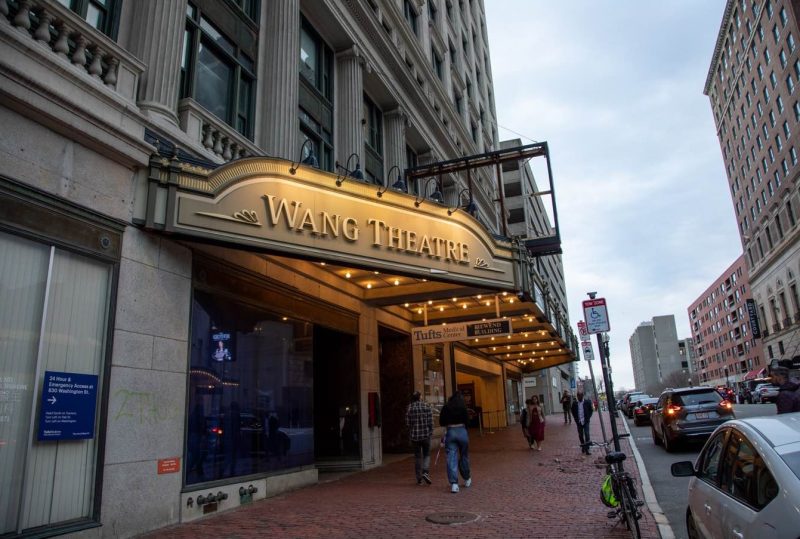
But then familial duty called. The man born Josiah Spaulding II moved to downtown Boston to rescue the ailing Wang Center, a place drenched in history and drowning in debt. Spaulding remembers coming to shows as a child with his parents and grandparents and, as a young man, sleeping under the marquee in order to ensure tickets for Cat Stevens. He set about transforming it, diversifying the presentations, creating outreach programmes that provided valuable work experience for the young and disadvantaged. On the Wang’s vast stage appeared a non-stop parade of marquee names – among them, Bob Dylan, Van Morrison, Leonard Cohen, Elvis Costello and the Brodsky Quartet, Neil Young and, of course Baez, whose early stardom across the river at the now-legendary Club 47 put the region on the musical map. However, by the 2010s, with Broadway dominated by two companies and LiveNation having a stranglehold on concerts, life once more became difficult.
“What could we do that might provide the opportunity to do something that no one else has ever done,” was the question that obsessed Spaulding and led to a 3am lightbulb moment. “I was a folk artist. I know how important Boston was. I had a record label here. I recorded many of the artists, toured with them, hung out with them”. His first thought was for a folk music hall of fame, but he needed to know if it would work and if the city would support it. He called old friends in the music world and talked to musicians who came to play the Wang, including Neil Young, who told him it was “a friggin’ fantastic idea” – and then went on-stage to proclaim to a cheering audience: “Boston is the folk music capital of North America”.
Then someone told Spaulding that “folk means old”, even though the number of young artists on the folk circuit, in the US as in Britain, testifies to its vitality. He had to feature “Americana”, which was “new.” Spaulding didn’t necessarily agree, pointing out that The Band had branded themselves as Americana way back in the 1960s. So too Young and Joni Mitchell, perhaps because they were all Canadians. Nevertheless, he was happy to embrace Americana. Then someone else told him he couldn’t leave out “roots”. Which was where the problems of nomenclature really started. Roots could be blues, bluegrass, southern rock…
Roseanne Cash and Ry Cooder finally clarified things. “They were doing a Cash on Cash show… And Roseanne said to me: Joe, I gotta go to Marblehead… because the first of the Cash clan came over from Ireland on a boat called The Good Intention and it docked in Massachusetts and they lived in Marblehead before they moved to Arkansas.”
“Now that to me is roots!” exclaimed Spaulding, excitedly, his deep voice rising to a crescendo. “Roots came from Africa, it came from the Jews, it came from the Irish…. It emigrated here. The first African-American meeting house in the US is in Boston. It was from here that it all grew and continues to grow. Everything is entangled… folk, Americana, roots. We went to trademark it and discovered that no one had ever put those three words together.”
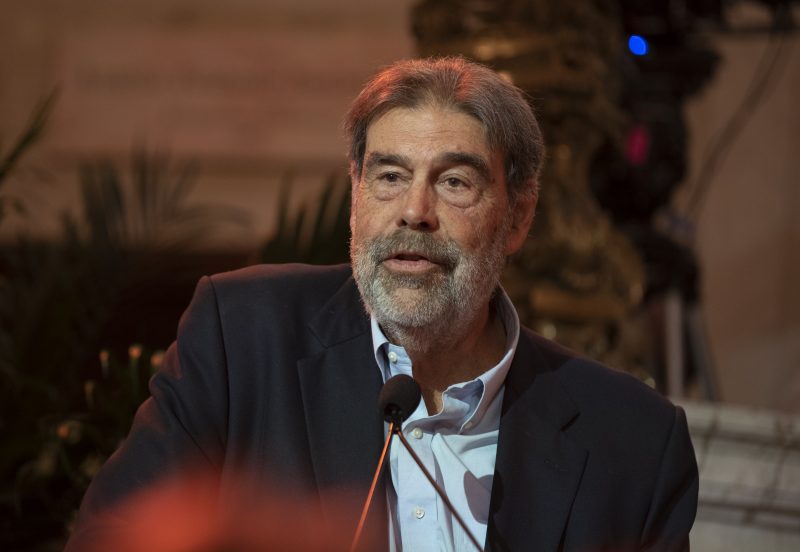
Spaulding has, to coin a folkie phrase, done some hard travelling in the years since that early morning reveille and at the grand Inaugural Induction Ceremony he had every reason to claim some laurels. But as he stood at the podium amid the gilded splendour of the Wang Theater, dressed in what Americans inevitably call slacks and a blazer, there was simply that old-fashioned sense of noblesse oblige. And delight, sheer delight. Joe was among old friends. His life had come full circle. Or as Joni Mitchell, honoured as a Solo Living Artist, once put it: “We’re captive on the carousel of time”.
And time, as Dorothy Parker famously put it, “doth flit/oh shit”. It’s 66 years since Joan Baez made her debut at Club 47 Mt Auburn Street in Cambridge. She was paid $10 a night but with lines snaking round the block, her fee was soon raised to $25. Betsy Siggins who, like Baez, was supposedly studying drama at Boston University was waitressing, book-keeping, and scheduling artists at the Golden Vanity and Café Yana across the river in Boston. Pretty soon she would be presiding over Club 47. Harvard undergrad Tom Rush, who Rolling Stone credits with ushering in the singer-songwriter era with his championing of Mitchell, Jackson Browne, and James Taylor, would later take over Siggins’ role. So here they all were, white-haired and bespectacled now, back in town for what must have felt like the best of college reunions.
Wasn’t that a time!
The festivities that Spaulding had long dreamed of took place over two days, a weekend devoid of formalities and hierarchy and red carpets and from which the press was absent, house photographers and PBS low-key and unobtrusive. Throughout Friday afternoon, familiar faces appeared in the hotel lobby, well-travelled guitar and banjo cases in hand. Progress toward check-in was slow, everyone eager to catch up with old friends. Just being present was spine-tingling and emotional.

Friday evening was drinks and a buffet in the Wang’s Grand Lobby. Spaulding’s welcome speech was short, the CEO as keen as anyone to get on with the main business of the evening – conversation and music-making. Old friends quickly caught up: Betsy Siggins with Joan Baez, soon joined by Tom Rush, Livingston Taylor, and a sprightly-looking Frank Hamilton, who took over Pete Seeger’s role in The Weavers; Linda and Alvin Singh, Lead Belly’s irrepressible niece and great-nephew; Will Dailey, a bright new star on the Boston scene…

Elsewhere the Guthrie and Seeger clans gathered, Anna Canoni and Cole Quest, Woody’s grandchildren (their mother Nora was down with Covid), and Tinya, Pete’s daughter, and his grandson, Kitama Cahill-Jackson – the families are constantly in touch, carrying the torch. Josh White Jr was accompanied by his son Josh White III, who is the spitting image of Josh White, the man they were there to see honoured. Peter Yarrow, who’s known Josh Jr since they were both in short trousers, was there with Noel Paul Stookey, Mary sadly present only in spirit. Peter Pickow, son of Jean Ritchie, was there, and James Brand and Jeanne Brand-Derienzo, son and daughter of Oscar Brand, whose radio show provided a platform for folk artists for seventy years; Meredith Moon Lightfoot, daughter of the great Canadian singer-songwriter Gordon; Caleb Hellerman, son of Weaver Fred; Lisa Danko daughter of Rick; Boots Jaffe and Michelle Esrick, son and daughter of Odetta; Rachel Marco-Havens, daughter of Richie Havens. Fiona Prine, the ever-gracious widow of John, who overcame so much only to fall victim to Covid.
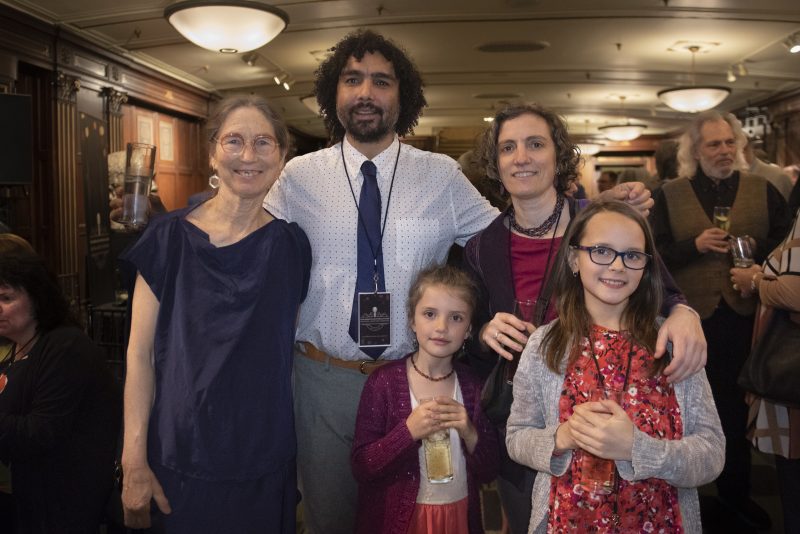
After drinks and dinner, it was downstairs to the Cultural Heroes Lobby, where Alan LeQuire’s imposing bronzes of Marian Anderson, Paul Robeson, Woody Guthrie, Billie Holiday, Lead Belly, Bessie Smith, Josh White et al bear silent witness to the role of music in the civil rights movement, the women’s movement, the anti-war movement. The guitars and banjos were already arrayed and Canoni took the stage to read one of Grandfather Woody’s most celebrated poems: “I hate a song that makes you think that you’re not any good. I hate a song that makes you think that you are just born to lose. Bound to lose. No good to nobody. No good for nothing. Because you are either too old or too young or too fat or too slim or too ugly or too this or too that…. songs that run you down or songs that poke fun of you on account of your bad luck or your hard traveling. I am out to fight those kinds of songs to my very last breath of air and my last drop of blood.”
Chuck McDermott, resident singer-songwriter and Spaulding’s right-hand, a man with campaign experience in Washington DC, took the stage as MC. He talked about “the power and importance of song” before opening with a song of his own, ‘Here’s the Thing About America’, calling everyone to action. Frank Hamilton talked about friend and mentor Peter Seeger, and about Peekskill, where in 1949 the mob viciously attacked Paul Robeson. Then he tuned his five-string and launched into ‘Hold the Line’ and ‘Wasn’t That a Time’. Immediately, everyone was singing. The years dropped away. Meredith Moon followed, talking about her dad and singing ‘Oh So Sweet’ in loving tribute.
Josh White was up next. He’s Eleanor Roosevelt’s godson – let that sink in! – his father having sung at FDR’s 1941 and 1945 inaugurals and been a regular visitor to the Roosevelt White House. Josh Jr sang Josh White Sr’s version of ‘House of the Rising Sun’ – the slow blues, minor-key version that’s provided the starting point for every cover since. Previous versions of the Appalachian song had been fast and in a major key. You could have heard the proverbial pin drop.

He was a hard act to follow, as Will Dailey acknowledged, but boy was he up to the task, singing ‘Turn, Turn, Turn’ in honour of The Byrds and then a cover of ‘Handsome Johnny’ in honour of Richie Havens, a performance truly deserving of that time-worn phrase, tour de force. It blew everyone away, including Tom Rush who followed. Departing from his planned opener, he opted instead for comedy, dedicating ‘It Takes An Awful Lot of Liquor to Love Her’ to Siggins, a revered figure on the American folk scene who he’s known since Club 47 days. Then “the song that put my kids through college”, best known in Britain in the Walker Brothers version: ‘No Regrets’. Livingston Taylor, younger brother of James, was next, and after his solo he called Dailey back to the stage. They were joined by Noel Paul Stookey in a roof-raising version of – what else? – ‘Goodnight, Irene’. Lead Belly’s bronze seemed to smile in benediction.
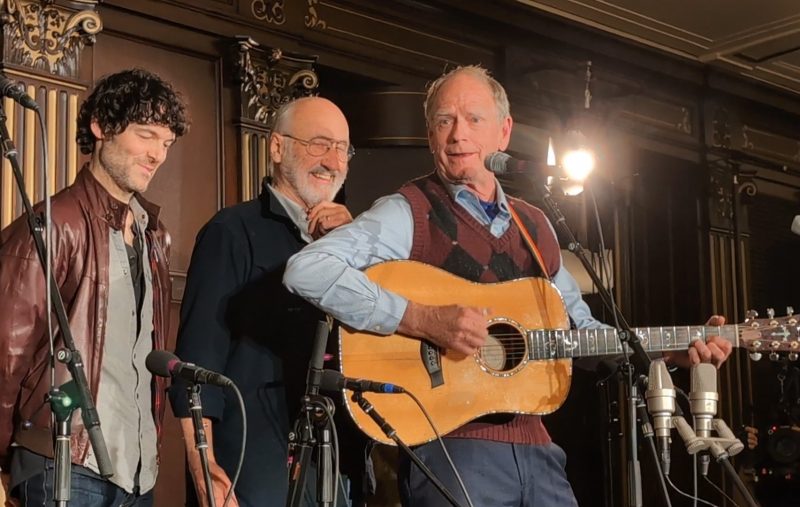
On Saturday, PBS was recording interviews with the Class of 2024 honourees or their representatives. Everyone else had time to tour behind the scenes of the vast and magnificent Wang Theater, its architecture inspired by the Paris Opera, and to see the wide-ranging collection of artefacts assembled by McCloud: Lead Belly’s huge 12-string, Pete Seeger’s banjo, Jean Ritchie’s dulcimer; Howard Fast’s account of Peekskill USA, signed by both the author and Robeson; Leonard Bernstein’s tailcoat and baton; and much besides, a treasure trove covering the vast swathe of Boston area music history. Archivist David Bieber, who has never knowingly thrown anything away, provides an ever-changing display of posters, ads, records, and books in the Music Hall Room, which also houses a number of guitars owned by auto billionaire Ernie Boch, whose family foundation supports the Wang and Schubert theatres that comprise what is now the Boch Center.
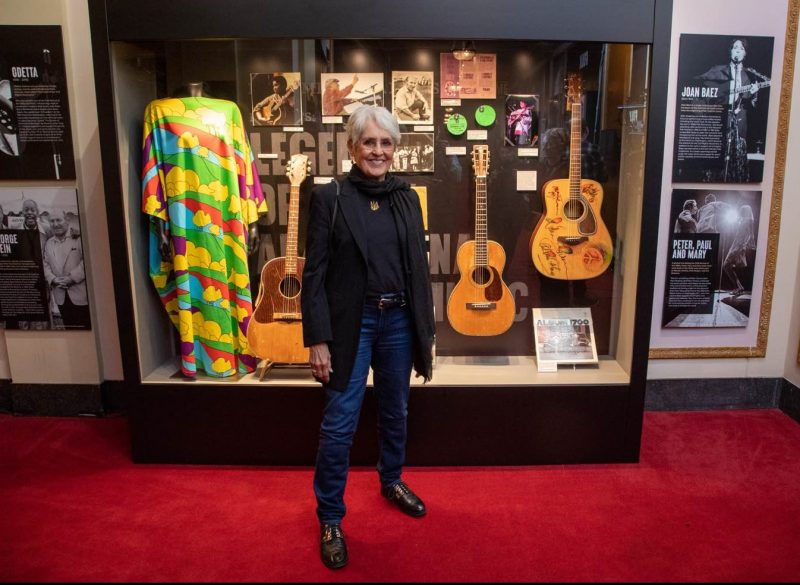
The evening awards ceremony itself was light on both formalities and words, with one speech for each of the representative award groups – Fiona Prine for Solo Legacy Artist, Joan Baez for Solo Living Artist, Peter Yarrow and Noel Paul Stookey for Duo/Group, and Betsy Siggins for Non-Performer. Frank Hamilton spoke as the Paul Robeson Artist/Activist honouree. There was no grandstanding, just short and thoughtful speeches. “These are my roots, this community are my people”, said Baez, her voice cracking with genuine emotion. “It’s really important for me to be here for me, and for all of you to be here for all of us.” It was a truth universally acknowledged.
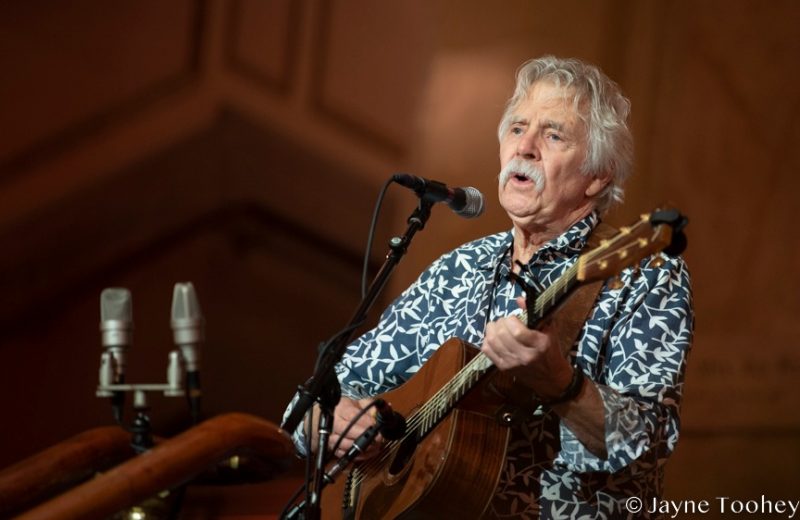
The evening concluded, as of course it should, with music. Tom Rush sang ‘The Circle Game’, recalling how Joni Mitchell had mailed it to him unsure that it was any good. Baez danced her way up the stairs to sing ‘Ain’t Gonna Let Nobody Turn Me Around’, a song of defiance that’s echoed down the years – and last year at Nashville Airport, when Baez ran into Justin Jones just after he’d been ousted from the Tennessee General Assembly having protested for gun control. Then she called up Peter and Paul, and together they sang ‘Blowin’ in the Wind’. The emotion was palpable. The two men closed with ‘Light One Candle’ and ‘In These Times’, songs that remain as topical today as when they were written.
And that’s the point about folk music, roots music, Americana – whatever you choose to call it. It is ever topical, and, in the Wang Theater, the people who had marched on Washington, and in Selma and Montgomery, against Vietnam and against so many wars since, sang out loudly once more. Everyone felt the hand of history on their shoulder. Betsy Siggins summed it up neatly: “Music is power, and the folk community uses it well.”
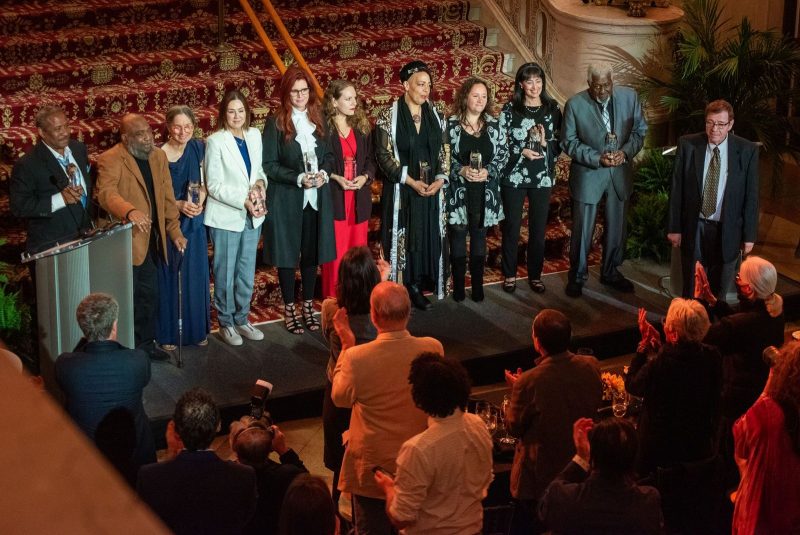
Folk Americana Roots Hall of Fame Inaugural Class of Inductees
Solo Legacy Artist – a performer whose initial impact on the genre was at least 45 years prior to the year of Induction.
-
- Gordon Lightfoot
- Jean Ritchie
- John Prine
- Johnny Cash
- Josh White
- Lead Belly
- Odetta
- Oscar Brand
- Pete Seeger
- Richie Havens
- Woody Guthrie
Solo Living Artist – a performer whose initial impact on the genre was at least 25 years prior to the year of Induction.
-
-
- Bonnie Raitt
- Emmylou Harris
- James Taylor
- Joan Baez
- Joni Mitchell
- Mavis Staples
- Ramblin’ Jack Elliott
- Taj Mahal
- Willie Nelson
-
Duo or Group of Musicians – performers whose initial impact on the genre was at least 25 years prior to the year of Induction.
-
-
- Peter, Paul & Mary
- The Band
- The Byrds
- The Weavers
-
Non-Performer
-
-
-
- Albert Grossman (Former manager to many musicians in the folk music scene.)
- Betsy Siggins (Founding member of the Club 47 venue now Passim in Boston; assisted in creating the Festival of American Folklife and founder of the New England Folk Music Archives/Folk New England.)
- George Wein (Jazz promoter, pianist and producer as well as founder of Newport Jazz Festival; co-founder of the Newport Folk Festival and instrumental in the founding of the New Orleans Jazz and Heritage Festival.)
-
-
Paul Robeson Artist/Activist Award – dedicated to those with the same integrity as Paul Robeson, the epitome of the 20th-century Renaissance man.
-
-
-
-
- Frank Hamilton – (American folk musician, member of The Weavers and co-founder of Old Town School of Folk Music.)
-
-
-
Folk Americana Roots Hall of Fame, 270 Tremont Street, Boston, MA 02116
https://www.folkamericanarootshalloffame.org/
Liz Thomson is the author of the award-winning biography Joan Baez: The Last Leaf (Palazzo Editions) and the revising editor of No Direction Home: The Life & Music of Bob Dylan (Palazzo) by the late Robert Shelton, whose New York Times review is credited with launching Dylan’s career. She is shortly to begin work on a biography of Betsy Siggins. Liz is also the founder and joint artistic director of The Village Trip, a festival celebrating arts and activism in Greenwich Village and the East Village. This year’s festival takes place from 14-28 September.
AUK would like to thanks Liz Thomson for her words and thanks also to all the photographers who contributed.